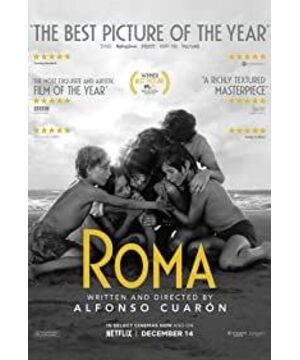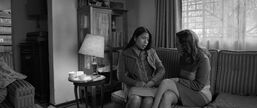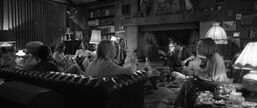1. Cruel Youth Story
"Just now there was a kid who was throwing water balloons at a passing car, and then an army jeep drove by, and the soldiers in the car got irritated and got out of the car and shot him."
"God, is he okay?"
"The gun was shot in the head and he died."
As the little boy naturally narrated the above story, we came to the dining table of a large family in the Roman community and opened up the director's private memories. The family-style and slowly unfolding life fragments captured by the 65mm camera, accompanied by black and white tones, are in line with the personal attributes of the author's film, but the director has revealed the clues of the environment from the characters from the beginning of the film, but it has produced extremely intense, so that Unsettling contrast.
Considering that such films are usually closely related to social attributes, the audience will naturally hope to draw out the elements of that era from the personal fate of the characters, and feel the great power of time and the yearning for the unique culture of a certain period in the changes of the characters arc. , to achieve the purpose of film empathy. But the work "Roma" is obviously not so vulgar or highlighting such "points of view". Our perspective is a quiet bystander, no matter if you are like the director, you are incarnated as a little boy in this family, or you and the director The maids serve the family together. Under the language of the camera, it is all external factors that advance our role, a process that is slowly swallowed by that world. Here I just noticed the photography skills of the film. In the delicate and delicate pictures, there are smooth and mechanical motion shots, which are very suitable for serving the story, rather than showing off skills. The audience naturally becomes a part of this community, from the surroundings of children and young maids, into this undercurrent youth story.
2. The Great and Violent Symbol
When the wife and her husband parted, the child and the maid stopped and watched in the distance of the camera, becoming an observational "other". The two people in this whirlpool, the husband is indifferent and accustomed to it, the wife wants to express more but No way to start. After watching her husband drive off the street, a drum band crosses the front of the wife. She still stands and stares out of the frame, wrapped in the crowd and music. The inner language of the characters is fully expressed in this unbalanced scene.
Immediately after, the maid watched the little life in the nursery room after the physical examination. When the earthquake struck, others knelt down and prayed. After the wife was harassed, a forest fire broke out. Even when the fire was put out, the chanting allegory showed a strong symbol. , on one side are trivial fragments of life, and on the other side are violent voices that transcend the picture and speak for the characters. This abnormal arrangement constantly externalizes and strengthens the character's sense of life, while the audience is in a wonderful position between bystanders and substitutes. The advantage of this kind of detachment is that we don’t feel abrupt about the obvious hints and symbols in the whole movie. For example, the direct portrayal of male characters in the film, this kind of emotion that is deliberately absent, would have made people feel unreal, but it has produced a harmonious relationship in the frequent symbols. So in the end, we were not surprised or questioned when we saw the deliberate plot of the maid who broke the amniotic fluid and gave birth to a dead baby immediately after meeting the man who abandoned her in the student movement. The director skillfully used surreal expression techniques and Fragmented narrative achieves unity between characters and literature.
3. "We women are always alone"
I think "Roma" is a backstage musical, where feminism acts as the melody, making all performances based on plot and musicality. Some viewers think its feminist expression is clumsy and direct, and the female characters are forced to make choices and are driven by the whole story background, but I appreciate this way of hiding emotions and motivations under the plot, rather than hysteria expression of independence and struggle. The feminism of "Roma" embodies modernity, universal values, and at the same time contains a sense of rhythm. In the story of the stormy sea, the brilliance of women is like the final beach scene. After the maid bravely rescued the child, all the characters hugged and cried. She cried out her views on life, completed her self-rescue, and passed through the light of the clouds. Shine on them, the Eternal Feminine, and guide them onward.
4. Installation artistry
In the audience's view of "Roma", an interesting point is that the director tells an overly sophisticated allegorical childhood memory, but blurs the background of the student movement at that time or the suppression of the revolution in Mexico. This is not commensurate with the exquisite pictures and smooth shot scheduling. It is just that the emotional time of the son is far from the style of Latin American literature.
It is true that the film contains a lot of delicate character relationship and composition, and many scenes are placed with sharp contrasts, but there is no violent conflict. I just found the fun of watching it. The wholeness of society should be perceived by its external appearance, but when we become skin-like characters, and become part of perceiving and touching the clues through clues, the emotion of the story is prolonged. We become members of the Roman community, equally bewildered by our place in that society. It's as if the characters in the story don't know they're being read.
View more about Roma reviews











